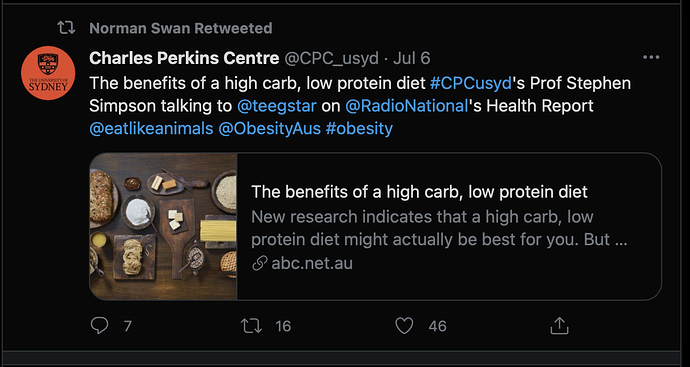My response from my Uni account
The myth that Norman can’t apparently see past - and to be fair most physicians can’t see past, is that metabolic syndrome is caused by weight gain. And following from that myth the non-sequitur that weight loss therefor must reverse metabolic syndrome.
Jeff Volek’s crossover eucaloric dietary carbohydrate restriction study [ https://www.ncbi.nlm.nih.gov/pmc/articles/PMC6629108/ ] took 16 people with metabolic disease and gave them 3 different diets in crossover (4 weeks each) and PREVENTED them losing weight (by requiring they eat more calories if they started to lose weight) and reversed metabolic disease for which one of the hallmarks is obesity (elevated triglycerides, depressed HDL, elevated fasting glucose, elevated systolic BP).
To clarify, they took 1 of the 5 markers of metabolic syndrome off the table and still reversed 3 out of 4 of the remaining markers - on a low carb diet for 9 of the 16 subjects.
The mechanism of action of a ketogenic diet against type 2 diabetes is not weight loss. Glycostasis occurs in a day. Weight loss (absent the dehydration from glycogen drawdown) takes at least a week.
The mechanism of action is replacing a broken homeostatic regulation (insulin regulation of post prandial hyperglycemia) with a functioning one (hepatic regulation of hypoglycemia).
I suspect Dr Swan knows this. Every doctor learned about gluconeogenesis in first year biochemistry. It’s the reason why humans don’t fall into a coma in their sleep. Glycogen is simply the buffer. What isn’t well understood is how the dots connect in type 2 diabetes.
The problem is when you eat carbohydrates for breakfast you take your blood glucose out of the range of the livers regulatory influence, and if you are insulin resistant you become reliant upon a dysfunctional pancreatic homeostat in an insulin resistant body, and reactive hypoglycemia requires that you medicate with carbohydrates all day.
The reason that the other markers of metabolic syndrome change is probably that if you don’t need insulin to respond to the transitory hyperglycemia from a meal, you need to make less insulin;
-
Elevated insulin at the kidneys increases sodium reabsorption, excess sodium in circulation increases serum osmolarity, that draws water from surrounding tissue, increased serum volume can promote hypertension. [ https://pubmed.ncbi.nlm.nih.gov/7512468/ ]
-
The ABCA1 transporter that effluxes cholesterol from pre-atherosclerotic macrophages into nascent HDL particles is sensitive to an insulin nadir [ https://pubmed.ncbi.nlm.nih.gov/20733269/ ]
-
Drawdown of circulating triglycerides by beta-oxidation is sensitive to insulin mediated acetyl-CoA carboxylase action via malonyl-CoA on the CPT-1a (fatty acid) transporter of the mitochondria. [ https://www.ncbi.nlm.nih.gov/pmc/articles/PMC281779/ ]
-
And glucose is self-evidently not elevated when the liver is regulating serum glucose.
I disagree with Dr Swans conclusion that a ketogenic diet is unsustainable. I have been on a well formulated ketogenic diet since May 20, 2014 and my HbA1c before going low carb was 11.2% and my HbA1c from November 2014 until now has remained at 5.2%.
One concern with advising patients to attempt a ketogenic diet is apparently the worry that low carb diets are high in saturated fat, and circulating saturated fat is associated with elevated cardiovascular disease. I would draw your attention back to the Hyde study (which included Ronald Krauss a subject matter expert on fatty acids and lipoprotein subfractions) which showed that on the low carb arm of the trial circulating SFAs in both triglycerides and phospholipids were lower than on the high carb arm, and that an LDL lipoparticle subfraction analysis showed a less atherosclerotic pattern in low carb vs high carb arms. Arguably a diet high in saturated fats is less atherogenic.
regards,
Richard Morris BSc (hons) biochemistry


 His long lived rats are running on mostly ketones. Just like humans on a high fat low carb diet.
His long lived rats are running on mostly ketones. Just like humans on a high fat low carb diet.

